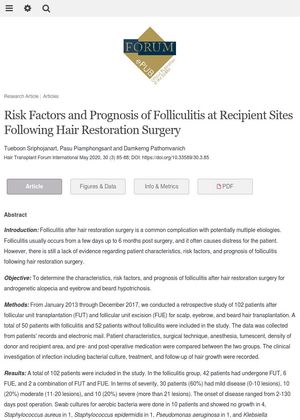Risk Factors and Prognosis of Folliculitis at Recipient Sites Following Hair Restoration Surgery
May 2020
in “
Hair transplant forum international
”

TLDR Younger people and those with existing acne are more likely to get folliculitis after hair restoration surgery, but it doesn't affect the overall good hair growth result.
The study conducted from January 2013 to December 2017 involved 102 patients who underwent hair restoration surgery for androgenetic alopecia and eyebrow and beard hypotrichosis. The study aimed to identify the characteristics, risk factors, and prognosis of folliculitis, a common complication after hair restoration surgery. The study found that younger patients (median age of 37 years) and those with preexisting scalp, face, and neck acne were more likely to develop folliculitis. The onset of the disease ranged from 2-130 days post-operation. However, there was no difference in surgical technique, anesthesia, tumescent, density of donor and recipient area, and pre-operative and post-operative medication between the groups. Despite the occurrence of folliculitis, the overall prognosis was good, with most patients reporting excellent hair growth after one year.




